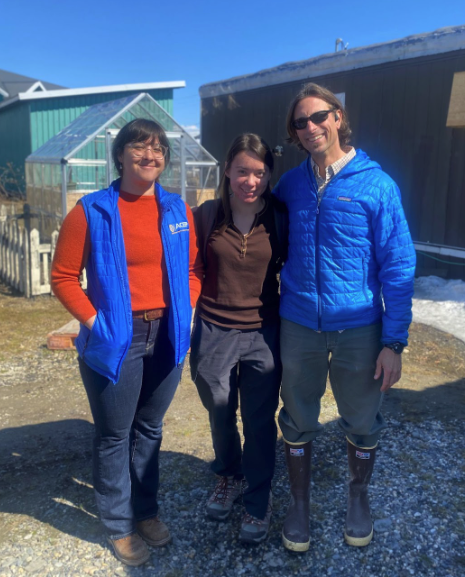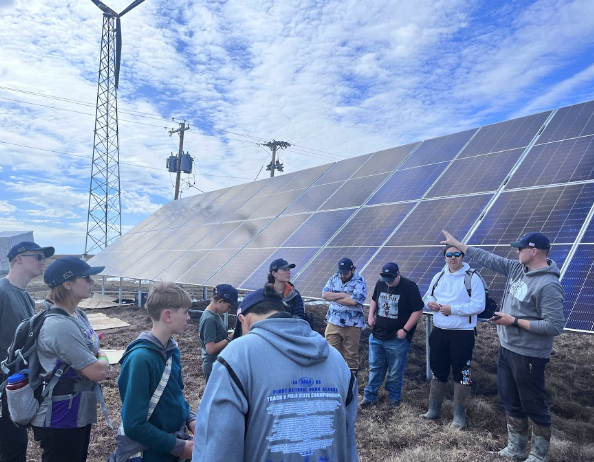Developing home energy audit curriculum for high school students
August 24, 2023

ACEP team members Alana Vilagi (left), Rachel Curtis (middle), George Reising (right) pose for a photo outside a home in Kotzebue where T3 students practiced collecting energy audit measurements.
This article is part of a series highlighting ACEP’s 2023 cohort of eighteen undergraduate interns. To read about other projects and learn more about the program, please visit the ACEP Internship Program website.
ACEP’s intern Rachel Curtis worked with Mark Masteller and Dominique Pride on the Kotzebue Home Heating Field Study. With feedback from George Reising, she then developed curriculum for Teaching Through Technology high school students, using the heating field study as a backdrop to explain why and how to conduct residential energy audits.
To introduce students to the benefits of home energy conservation and efficiency measures, Curtis designed lesson plans and a short, free, web-based educational home energy audit game. The game introduces students to tools commonly used in energy audits, guides students through manual calculations of building envelope R-values, and helps students interpret audit results and evaluate appropriate retrofit measures. For students seeking college credit for the T3 Upward Bound energy audit course, Curtis designed activities and tutorials to introduce students to the professional energy auditing software AkWarm.
The purpose of the T3 energy curriculum is to enable students to conduct unofficial home energy audits in their own communities. Improving access to energy audits helps homeowners to make informed choices about energy conservation and efficiency improvements and to reduce fuel oil consumption and space-heating costs.
The fact that rural communities in Alaska face the highest fuel costs in the nation and that they are among the first to feel the effects of climate change “somehow” brought Curtis, who studies electrical engineering and physics at Trinity University in San Antonio, Texas to “the Alaskan interior to UAF, and even further to the villages of Kotzebue and Noatak above the Arctic Circle Alaska.”

Matt Bergan, engineer at Kotzebue Energy Association, gives a tour of the Kotzebue wind farm and solar arrays to T3 students.
“It’s an incredible privilege to be invited into homes so many miles from my own, to know I’m only here because conversations happened in a supermarket, and, before that, countless hours of phone calls and paperwork,” she said.
Curtis is thankful to her mentors and others who she worked with during her internship for their encouragement to pursue her own creative vision and to integrate nontraditional elements such as online and in-person gameplay into the curriculum.
“It was invaluable learning with the T3 students and from everyone at ACEP. The people here have a lot of heart, and I can’t wait to come back,” she said.
This internship is funded by the NSF Navigating the New Arctic planning grant through the ACEP Undergraduate Summer Internship program. View the final presentation for this project on ACEP’s YouTube Channel. For more information on this project, please contact Dominique Pride at djpride@alaska.edu.


